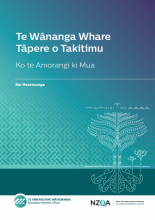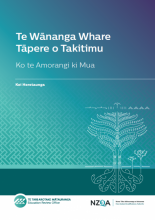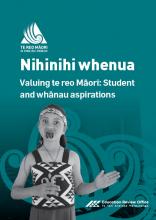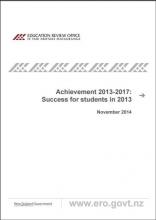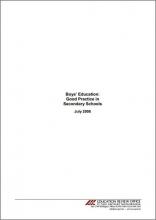- Topics: Disability action groups, Education and care centres, Pastoral care, Te Ihuwaka, Te Pou Mataaho | Evaluation and Research Māori
- Published: 26 May 2022
Starting School Together: What Do We Know?
Starting school is a major childhood event. It can be an exciting time for children and their families. But it is a big change, and so it can also be an uncertain time. A good start at school sets children up to succeed at school. We looked to see how changing to cohort entry impacts on children, their peers, and whānau, as well as their schools and early childhood education services.
- Published: 25 May 2022
Starting School Together: What Do We Know About Cohort Entry? Summary
Starting school is a major childhood event. It can be an exciting time for children and their families. But it is a big change and can be an uncertain time. Since 2018, schools have been able to have children start in groups at certain dates during the year. This is called cohort entry. ERO found that cohort entry has a range of benefits for children’s wellbeing and learning, schools’ ability to structure transitions more easily, and for teachers due to fewer disruptions and more time to teach.
- Published: 09 May 2022
Learning in a Covid-19 World: The Impact of Covid-19 on Pacific Learners
The disruptions caused by Covid-19 over the last two years have been challenging and long lasting. Auckland in particular has had many lockdowns and is where the majority of Pacific learners live.
Pacific communities have faced the challenges of Covid-19 with resilience and schools have put in a range of responses to support Pacific learners through the disruption. This report shines a light on these challenges and shares successful strategies.
- Published: 06 May 2022
Learning in a Covid-19 World: The Impact of Covid-19 on Pacific Learners - Summary
The disruptions caused by Covid-19 over the last two years have been challenging and long lasting. ERO’s new report, Learning in a Covid-19 World: The Impact of Covid-19 on Pacific Learners, looks closely at the achievement, attendance, mental health and wellbeing, school contexts, and education pathways of Pacific learners over this time. The report shines a light on challenges and shares successful strategies.
- Published: 19 Jan 2021
Te Kahu Whakahaumaru – Ngā mahi a te rangai mātauranga Māori (English)
Te Pou Mataaho, ERO’s evaluation and research group, and Te Uepū ā Motu, ERO’s national evaluation and review team, pursued this evaluation to provide an evidence base about the initial impacts of Covid-19 on Māori-medium education and how the sector responded.
- Published: 19 Jan 2021
Te Kahu Whakahaumaru – Ngā mahi a te rangai mātauranga Māori (Māori)
I whāia tēnei arotake e Te Pou Mataaho, te rōpū arotake, rangahau hoki a Te Tari Arotake Mātauranga me Te Uepū ā-Motu, te rōpū arotake ā-motu a Te Tari Arotake Mātauranga, ki te whakaputa i tētahi kohinga taunakitanga e kitea ai ngā pānga tōmua o te Mate Korona ki te rāngai mātauranga reo Māori, me ngā rautaki i whāia ai e taua rāngai.
- Published: 10 Dec 2020
Te Kahu Whakahaumaru: Māori continue to show resilience across Māori-medium education
In Aotearoa, Māori-medium education experienced significant disruption when the outbreak of Covid-19 forced kura to close their doors, and whānau and kaiako to adjust to home schooling and distance learning. Among the many challenges were access to technology and resources with Māori communities among the most affected.
- Published: 10 Dec 2020
E whakatinana tonu nei te rāngai mātauranga reo Māori i te manawanui
I Aotearoa nei, i tino raru te rāngai mātauranga reo Māori i te horapatanga o te Mate Korona, i kati ai ngā tatau o ngā kura, i mate ai hoki ngā whānau me ngā kaiako ki te tīni i ā rātou mahi ki te whakaako ki te kāinga me te ako tawhiti.
Ko tētahi raru i roto i te huhua, ko te korenga o ngā taputapu matihiko me ngā rauemi, ka mutu ko ngā hapori Māori ērā i rongo i te korekore rawa atu nei.
- Published: 15 Sep 2020
Nihinihi Whenua – Valuing te reo Māori: Student and whānau aspirations
This report provides a snapshot of student and whānau perspectives on the teaching of te reo Māori. It follows the June publication of Te Tāmata Huaroa, which provides a review of the current status of te reo Māori in English medium school settings.
- Published: 18 Jun 2020
Te Tāmata Huaroa: Te Reo Māori in English-medium Schooling
This report gives a snapshot of the current provision of te reo Māori teaching and learning in a representative sample of English-medium primary and secondary schools. The education sector is seen as an important lever in the Government’s Maihi Karauna strategy for language revitalisation.
- Published: 29 Nov 2019
Social Workers in Schools
This ERO qualitative case study report undertaken on behalf of Oranga Tamariki captures the voices of children and their whanau who were recipients of the Social Workers in Schools (SWiS) service. SWiS is a government funded, community social work service provided in most English and Māori medium, decile 1-3 primary and intermediate schools.
- Published: 11 Dec 2015
Inclusion of Children with Special Needs in Early Childhood Services
This national report presents the findings of ERO's recent evaluation of how well early childhood services include children with moderate to severe special needs. This evaluation supports the Government's priority for every child to have the opportunity to participate in early childhood education (ECE).
- Published: 30 Jul 2015
Secondary-Tertiary Programmes (Trades Academies) What works and next steps
The report examines how well 15 of New Zealand's Secondary-Tertiary Programmes (STPs or Trades Academies) are meeting the needs of students at risk of not staying or succeeding in education.
- Published: 11 May 2014
Achievement 2013-2017: Success for students in 2013
This report presents the findings of ERO’s evaluation of the Ministry of Education's initiative, Achievement 2013-2017.
- Published: 28 Aug 2013
Schools’ Provision for International Students
This national report is ERO’s seventh report about international students. This evaluation included 95 schools (both primary and secondary) and focused on five aspects in relation to international students – integration, progress and achievement, education programme, pastoral care, overall approach and self review.
- Published: 10 Dec 2012
Evaluation at a Glance: Transitions from Primary to Secondary School
This national report combines current research with findings from recent ERO reports about students' transitions between and through schools. The report discusses the important pastoral care and learning support processes needed for successful transitions.
- Published: 28 Feb 2011
Schools’ Provision for International Students
The evaluation looked at four aspects of international education (schools' self review, pastoral care, quality of education and social integration) and concluded that most schools were highly effective or generally effective in all four aspects.
- Published: 01 Jul 2008
Boys' Education: Good Practice in Secondary Schools
This Education Review Office report provides schools and policy makers with examples of how 10 New Zealand secondary schools successfuly support boys' education. The schools in this study were selected on the basis of their good overall levels of student achievement, previous positive ERO reports and their well-developed pastoral care and support strategies. Five boys' schools and five coeducational schools are used as case studies
